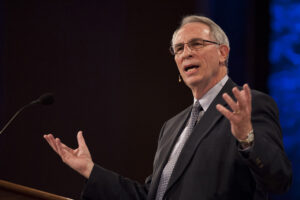

TYRONE, Ga. (BP) – More than we’d like to admit, life changes and it never goes back to the way it was. Yet, if life were a coin, there would be two sides. There would be the side of “I don’t mind losing these things” and then there’s the other side of, “I wish I could go back to the way it was.”
Maybe we just want things to be normal again. But there is no “normal again.” There is only what we can do now. It is what we can do now that leads us into a better future.
Sometimes it involves continuing to do the things we did in a crisis that we’d like to stop, but we shouldn’t. Therefore, I put before you at least six things that churches did during the pandemic that they need to continue today.
Continue cleanliness to the extreme
During the pandemic, something happened to the staff and members of our church. We all became vested in having a germ-free environment. Before the pandemic, I’d never thought twice about shaking someone’s hand or grabbing tongs at a Chinese buffet. But since all the sanitation, wipes, facemasks, hand sanitizer, etc., I’ve become much more conscious about cleanliness. If I have, you can bet others have too.
Cleanliness in the restrooms, food service and children’s area are standards you drop at your peril. Assume this: Nothing is too clean. If it doesn’t smell clean, it’s not clean. If it doesn’t look clean, it’s not clean. Keep food covered, offer clear plastic serving gloves at your potlucks, keep hand sanitizer in public places, have sanitizer wipes in the restrooms and all eating areas. Make face masks available for those who want them. They should be available, but not suggested or mandated. This shows deference to others.
Promote online giving
Some churches wouldn’t have adopted online, app or text giving when they did if it were not for the pandemic. This is one good thing that came out of it.
My father taught me generosity to God’s work by sending me to church with a check for the offering. You can still do that, but now you also have other ways to give. I don’t think we should limit the ways people give financially to God’s Church.
Don’t make it an “either/or” but a “both/and” situation. Keep promoting online giving. If necessary, make a tutorial video on how to give online, via text or app for your more mature members who are not familiar with the newer ways of sharing currency.
Keep someone dedicated to online outreach
In the early days of our time of lockdown and distress, we turned to Facebook Live, Zoom, YouTube and the church’s website to share ministry and make connections. You still need to do this!
Don’t fall into the belief that now that the pandemic is over, we can go back to normal (which means just doing ministry like before). Friend, there is no normal to go back to. If you want to reach new people, especially those under 60, you need to keep up and even improve the digital footprint of your church.
Your website needs fresh content every week. Your social media needs photos and videos of what’s happening with the church pumped out weekly. If you are not active and increasing the quality of your digital presence you are nowhere.
If you’re a pastor reading this, I’m not saying that you need to be doing this yourself. Maybe it started with you, but now’s the time to hand it off to someone else. That may not be your calling, but it will be somebody’s.
Make digital ministry a real thing and keep it a real thing in your church. Put it in the budget. Digital ministry is the front door of your church. If you are not actively working this in your church, you are basically locking the front door. Very, very few new people will come to your church unless they can first experience it in some way online. If you are not leveraging this, you are losing guests, potential members and givers before you even know you could have had them.
The apostle Paul wrote, “I have become all things to all people, so that I may by every possible means save some.” (1 Corinthians 9:22, CSB). If you’re unwilling to make the permanent shift to a focused, engaging and quality digital ministry, you should check and see if you still have the same heart as the apostle Paul.
What if you don’t know what to do? Find out. What if you’re uncomfortable with it? Do it anyway. The problem is that some churches want to reach people, but only in the way they like, not in the way that will actually engage them. Your outreach and evangelism strategy is perfectly designed to accomplish the results you have been getting. Doing more of the same will not get you different results.
Intentional care for all members
The deacons and small group leaders of our church in 2020 and part of 2021 had a phone call campaign. They divided up the membership among themselves and called every member household asking how they were doing, how we could pray for them and whether there were any needs that the church might address.
This was the first time in a long time that some of our members were personally contacted just to see how they were doing.
We don’t need to wait for a pandemic to come in order to check on our church members. Continue to do member care. Find a system that will work using the network you already have of small groups, care leaders and deacon ministry.
Make everything accessible online
My wife and I like to eat out. Something I still notice in restaurants is the presence of QR codes that link to a menu. These codes came into prominence with the fear of transferring the coronavirus over surfaces, like menus. Today, most places we go offer physical menus (most all are laminated) but they still offer QR codes.
If restaurants still make digital versions of their menus online, why can’t your church offer QR code for a connection card or bulletin as well? I’m not saying to stop using a paper card and bulletin. But offer it online as well. Your online viewers may use them too.
I’ll go one step further. Offer everything you can online as well as printed. This goes for small groups too. Every church should consider having or continuing an online small group. Maybe it is a small group that is also on Zoom.
Put your trainings online. Record everything you can and put it online. At worst, those leaders who miss the training will be able to catch up. If you push that content out to your membership, you may have more willing members to volunteer as leaders.
Force yourself to stretch
At the beginning of the pandemic, I was working with dozens of church planters. Creativity and flexibility are a part of the makeup of a successful church planter. When large group gatherings were discouraged, these planters pivoted immediately without missing a Sunday.
A few of them started drive-in worship. People would stay in their cars in a parking lot, roll down windows or tune their FM radio to a particular frequency to hear the service going on at the other end of the lot. Some had a lawn chair service at a park or at their venue, keeping social distancing. Others just did Facebook Live or YouTube services, dialoguing with people in the comments box.
Our church also did daily video devotionals over Facebook using staff members and teachers taking turns. This was one of the most well received things the church did during this time. Some of the videos were done in the church office, but some were recorded at home, on the back patio or in another unique place.
I think Plato was the first to take credit for this saying, “Our need will be the real creator.” Today we just say, “Necessity is the mother of invention.”
The crisis we entered demanded creativity and flexibility to survive. Keep that spirit! What the pandemic forced us to do in creative action we need to do ourselves to stay fresh and relevant.
As you read through this, I hope you were thinking about your situation. What are some things that you started during the pandemic that you really should continue? It was a hard time, and I don’t know anyone who would want to go through it again, but there are some valuable things that did come out of it.
Don’t lose them. You paid a price for them, don’t let it go to waste.
Jimmy Kinnaird is the associational mission strategist for the Fairburn (Ga.) Baptist Association. He’s served as a pastor for 21 years and in various denominational and consulting roles for 14 years.














